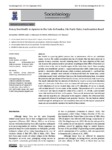Please use this identifier to cite or link to this item:
http://www.alice.cnptia.embrapa.br/alice/handle/doc/1006569| Title: | Honey Bee Health in Apiaries in the Vale do Paraíba, São Paulo State, Southeastern Brazil. |
| Authors: | SANTOS, L. G.  ALVES, M. L. T. M. F.   MESSAGE, D.   PINTO, F. A.   SILVA, M. V. G. B.   TEIXEIRA, E. W.   |
| Affiliation: | L. G. SANTOS, UFV; M. L. T. M. F. ALVES, APTA-SP; D. MESSAGE, Universidade Federal Rural do Semiárido; F. A. PINTO, UFV; MARCOS VINICIUS GUALBERTO B SILVA, CNPGL; E. W. TEIXEIRA, APTA-SP. |
| Date Issued: | 2014 |
| Citation: | Sociobiology, v. 61, n. 3, p. 307-312, 2014. |
| Description: | Bee health is a growing global concern due to phenomena with as yet undefined causes, such as the sudden population decline of colonies that has been observed in apiaries in many countries, recently including Brazil. The main objective of this study was to assess the presence and/or prevalence of pathogens that afflict Africanized Apis mellifera bees in the Vale do Paraíba region of São Paulo state, Brazil. Three sampling periods were established: period 1 ? August and September 2009 (winter/early spring); period 2 ? December 2009 and January 2010 (summer); and period 3 ? April and May 2010 (autumn). The results demonstrate that although mites and microsporidia are widespread in the region?s colonies, the Africanized bees are apparently tolerant to pathogens and parasites. However, the mechanisms related to defense against pathogens are not completely clear, and monitoring and prophylactic measures are essential to maintain the health of bee colonies. |
| Thesagro: | Apis Mellifera |
| NAL Thesaurus: | Varroa destructor Paenibacillus larvae Nosema |
| Type of Material: | Artigo de periódico |
| Access: | openAccess |
| Appears in Collections: | Artigo em periódico indexado (CNPGL)  |
Files in This Item:
| File | Description | Size | Format | |
|---|---|---|---|---|
| Cnpgl2014SociobiologyHoneybeehealth.pdf | 461,3 kB | Adobe PDF |  View/Open |









